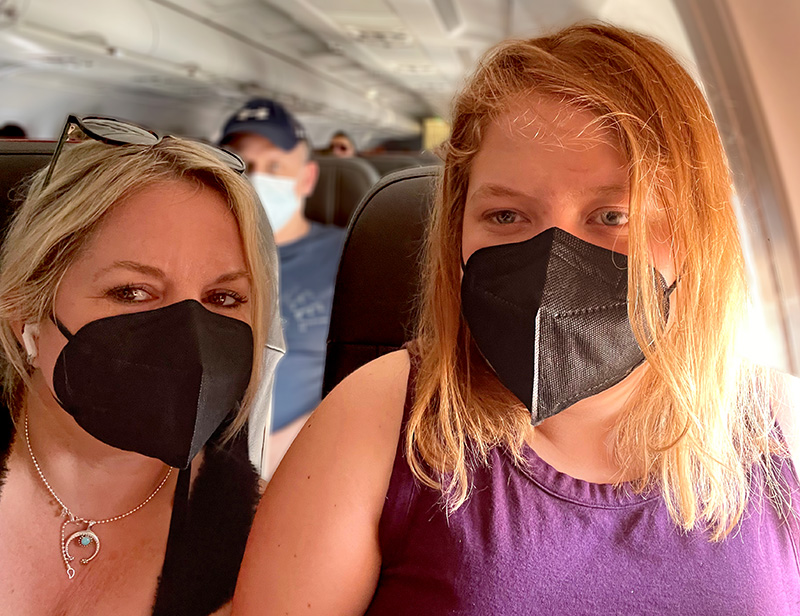Summer travel season is well underway. While traveling with children can be both fun and exhausting, if you are a parent or caregiver of a child with disabilities, even more planning may be required to have a safe and successful trip.
This summer, I decided to take my daughter Annie on her first plane ride. Annie is 20 years old, has autism, intellectual and developmental disabilities, and is minimally verbal.
Whether you are taking to the skies or hitting the open road this summer, there are some things I have learned over the years that parents and caregivers can do to ensure everything runs smoothly.

Devereux National Director of Family Engagement Amy Kelly, MBA, MNM, whose 20-year-old daughter Annie has autism and intellectual and developmental disabilities, says she helped her daughter prepare for her first plane ride this summer by talking to her about what she could expect on the trip.
Tips for Parents and Caregivers When Traveling
Practice, Practice, Practice: Use images, books, and social stories to help your child understand what to expect on an upcoming trip. Reassure them that being apprehensive or nervous about new experiences is normal and also how we learn and grow. Include photos of the final destination to spark excitement.
Tap Into the Five Senses: Many children have unique sensory needs and sensitivities. Think about the five senses when preparing for the trip:
- Sight: Talk to your child about what they may see at the airport or in other public transportation settings, such as crowds of people, flashing lights, and neon signs.
- Sound: Boisterous plane engines, squeaky bus brakes, and screeching trains may be some of the sounds your child may hear while traveling on mass transit. Pack headphones or soft earplugs to help dial down the noise.
- Smell: You can expect to smell everything from exhaust fumes to fast food to perfume when you travel to new places. If you have a loved one with a sensitive olfactory system, bring a mask or bandana so they can cover their nose.
- Touch: Prepare for the hustle and bustle of airports and other public transportation settings where you may brush shoulders with strangers and even have to undergo a pat-down check. Once on board the plane, train or bus, your child may not be used to the close proximity of the seats. Bring a comfort item, such as a blanket, pillow, or stuffed animal to help acclimate your loved one to their new environment. For younger children, the comfort of a familiar car seat also may do the trick.
- Taste: Food is different everywhere you go. If you have a child with dietary restrictions, pack snacks in your carry-on. Also, consider visiting a local grocery store when you arrive at your vacation destination to purchase familiar foods.
Get a Sneak Peek: Visit the airport or train station with your child before your actual trip. You may not be able to see or experience everything that you will on your day of travel, but this will provide them with a better idea of what is to come. There also may be customer service representatives on hand who can assist with access, so do not hesitate to ask for help.
Bring Toys and Games: Bring toys, games, or crafts that can fit easily in your carry-on. Surprise your child when they are looking for something to do or need a distraction. Some go-to items include: Play-Doh, Silly Putty, fidget toys, Magna Doodles, coloring books and crayons, whiteboards and washable markers, colored pipe cleaners to make into shapes, and decks of cards. Do not forget to pack your loved one’s favorite electronic gadget, such as an iPad or tablet.
Offer Frequent Praise: We all need praise and encouragement. Letting your child know how proud you are of them can go a long way in helping them achieve success. Focus on the positive moments instead of the frustrating ones. Set the “vibe” for the trip and model the behavior you would like to see.
In the end, Annie and I had a fantastic time on our trip – we went into it feeling prepared and ready to go on an adventure together. I wish you and your family the same success. Safe travels!
About Amy Kelly
Amy Kelly, MBA, MNM, is the mother to Danny, Annie and Ryan. Annie is diagnosed with moderate to severe autism, verbal apraxia, intellectual and developmental disabilities and general anxiety disorder. Amy is the National Director of Family Engagement for Devereux Advanced Behavioral Health, one of the nation’s oldest and largest nonprofit providers of behavioral healthcare, and serves as a family representative on several special needs boards in the community, locally and nationally. In addition, she participates with other patients and families in efforts supported by the Autism Care Network, and serves on an executive committee for the American Academy of Pediatrics, to assist children and adolescents with special needs and the importance of quality care.




